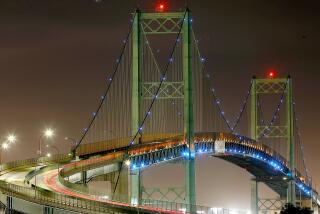House Votes to Block Money for Long Beach Freeway Extension
- Share via
WASHINGTON — The House voted Wednesday to ban spending any money from the new federal transportation bill on the Long Beach Freeway extension, handing at least a temporary victory to the city of South Pasadena in its continuing battle to stop the long-debated project.
The surprise measure was introduced by Rep. James E. Rogan (R-Glendale), whose district includes South Pasadena, and approved on a largely party-line vote of 241 to 190. Rogan immediately began lobbying the Senate to secure passage of his proposal, sending letters to California Sens. Dianne Feinstein and Barbara Boxer.
A Rogan aide said that, although the transportation bill contains no specific dollar amount for the freeway extension, his measure would “stop this project in its tracks for the year” because it would bar federal officials from dipping into the measure’s discretionary funds to finance work on the road.
But Rep. Matthew G. Martinez (D-Monterey Park), a supporter of the freeway extension, accused Rogan of wasting Congress’ time with a “pointless amendment.”
“This amendment bans an appropriation that was not made,” Martinez said.
Still, the vote was celebrated in South Pasadena, which has fought a decades-old battle to stop the proposed 6.2-mile freeway extension that city officials say would destroy 900 homes and 6,000 trees in their community, El Sereno and Pasadena. The $1.4-billion project would complete a gap in the 710 Freeway between the San Bernardino and Foothill freeways.
“This is yet another reason for abandoning this project,” said Martha Dale, South Pasadena transportation manager.
In neighboring Alhambra, officials labeled the vote pointless because actual construction is five to 10 years away. “The vote that really counts is when there is a recommendation for funding down the road,” Alhambra City Manager Julio Fuentes said.
Federal transportation officials had no immediate reaction to the House action. In Sacramento, Caltrans spokesman Jim Drago said that the impact could be limited because, even if Rogan succeeds in blocking use of the federal funds on the project, work ultimately could proceed with state, local or previously allocated federal money.
Rogan gained national attention as one of the House prosecutors in the Senate impeachment trial of President Clinton early this year. His role also earned him a top spot on the national Democratic Party’s “hit list” in the 2000 elections and a potentially strong challenger, state Sen. Adam Schiff (D-Burbank), who has announced his candidacy for Rogan’s seat.
Reacting to Rogan’s freeway proposal, Schiff called the measure a “good thing,” but questioned why the Republican had not introduced it in previous years.
Wednesday’s debate on Rogan’s amendment seemed a bothersome distraction to some House members, who found themselves in the middle of an argument over how best to solve Los Angeles’ traffic problems.
“I am curious why the U.S. House of Representatives on a late afternoon should override whatever the normal procedures are,” said Rep. Martin Olav Sabo (D-Minn.).
Rogan, in making his case, said: “The design of this freeway is decades old. We need to be focusing on transportation for the year 2000, not the year 1960.”
Rogan said he believes it would be less costly and less disruptive to widen existing city streets, said an aide.
But Martinez said the unfinished freeway extension has turned the Freemont Avenue/Valley Boulevard intersection into the county’s eighth most congested intersection.
Federal highway officials last year formally approved the freeway extension, but preservation groups and South Pasadena have continued to fight it in the courts. A federal judge recently announced his intention to issue a preliminary injunction barring construction of the freeway extension until the issue is settled at trial.
The $45-billion transportation bill, which passed the House, 429 to 3, provides funding for a number of Southern California transit projects, including $50 million to help pay for completing the Los Angeles subway to North Hollywood, $7 million for bus purchases to relieve crowding on the Metropolitan Transportation Authority bus system and $5 million to develop mass transit projects for Los Angeles’ Eastside and Mid-City neighborhoods.
Times correspondent Richard Winton in Pasadena contributed to this story.
More to Read
Sign up for Essential California
The most important California stories and recommendations in your inbox every morning.
You may occasionally receive promotional content from the Los Angeles Times.














